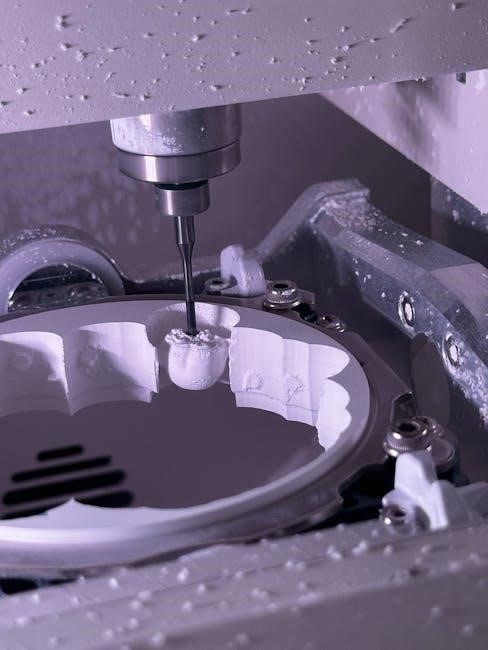mechanical aptitude questions and answers pdf
Boost your interview prep with our free mechanical aptitude questions and answers PDF. Perfect for engineering and technical assessments!
Mechanical aptitude tests assess problem-solving skills and understanding of mechanical principles, tools, and machinery. They are widely used in hiring for technical roles, evaluating spatial reasoning and simple machine concepts.
What Are Mechanical Aptitude Tests?
Mechanical aptitude tests are assessments designed to evaluate an individual’s ability to understand and apply mechanical principles, problem-solving skills, and spatial reasoning. These tests are commonly used in industries such as manufacturing, engineering, and construction to identify candidates with strong technical aptitude. The questions typically involve scenarios related to machinery, tools, and physical systems, requiring the test-taker to demonstrate their knowledge of how mechanical components function and interact. The format often includes multiple-choice questions, diagrams, and practical problem-solving exercises. By measuring a candidate’s mechanical reasoning and logical thinking, these tests help employers determine suitability for roles that require hands-on technical skills. For candidates, performing well on these tests can open opportunities in specialized fields and showcase their ability to work with mechanical systems effectively. These assessments are a crucial tool for aligning skills with job requirements in mechanically demanding professions.
Importance of Mechanical Aptitude Tests
Mechanical aptitude tests are essential for evaluating a candidate’s ability to work with mechanical systems, making them a critical tool for industries requiring technical skills. These assessments help employers identify individuals who can safely and effectively operate machinery, troubleshoot issues, and apply mechanical principles in real-world scenarios. By measuring problem-solving abilities and spatial reasoning, the tests ensure that candidates are well-suited for roles in manufacturing, engineering, and maintenance. They also reduce workplace risks by ensuring employees understand safety protocols and mechanical operations. Additionally, these tests provide a fair and objective method for comparing candidates, allowing employers to make informed hiring decisions. For job seekers, performing well on mechanical aptitude tests can significantly enhance career opportunities in mechanically demanding fields. Overall, these tests play a vital role in aligning candidate skills with job requirements, ensuring efficiency and safety in the workplace. Their relevance continues to grow as industries evolve and rely on advanced mechanical systems.

Key Concepts Tested in Mechanical Aptitude
Key concepts tested include mechanical reasoning, spatial reasoning, and simple machines, assessing problem-solving skills and understanding of mechanical principles essential for technical roles.

Mechanical Reasoning
Mechanical reasoning assesses the ability to understand and analyze mechanical systems, including gears, levers, pulleys, and hydraulics. It evaluates problem-solving skills and the application of physical principles to real-world scenarios. Key areas include identifying the relationships between force, motion, and energy, as well as understanding how mechanical components interact; These questions often involve visual elements, requiring candidates to interpret diagrams and predict system behaviors. Practice tests in PDF formats provide hands-on experience with such problems, helping candidates develop a deeper understanding of mechanical concepts. Regular practice enhances spatial awareness and logical thinking, which are critical for success in technical roles. Mastery of mechanical reasoning is essential for careers in engineering, maintenance, and manufacturing, where practical problem-solving is a daily requirement. By focusing on this area, individuals can improve their ability to apply theoretical knowledge to practical challenges.
Spatial Reasoning
Spatial reasoning is a critical component of mechanical aptitude tests, focusing on the ability to visualize and understand the relationships between objects in three-dimensional space. It involves interpreting diagrams, recognizing patterns, and predicting how objects might move or interact when forces are applied. Questions often require identifying shapes, understanding rotations, or determining how components fit together. PDF resources for mechanical aptitude tests frequently include spatial reasoning exercises, such as identifying missing parts in a machine or determining the correct assembly of gears. Practicing these problems enhances visual and analytical skills, which are vital for roles in engineering, mechanics, and technical trades. By mastering spatial reasoning, candidates can improve their ability to solve complex mechanical problems and perform tasks that require a strong understanding of physical relationships. Regular practice with PDF materials ensures better preparedness for the challenges of mechanical aptitude assessments.
Simple Machines
Simple machines are fundamental devices that form the basis of more complex mechanical systems. They include levers, pulleys, inclined planes, wedges, screws, wheels, and axles. These machines are essential for understanding basic mechanical principles, as they manipulate forces and motion to perform work. In mechanical aptitude tests, questions often focus on identifying and applying simple machines to solve problems. PDF resources provide detailed explanations and practice questions to help candidates grasp these concepts. For instance, questions might ask to calculate the mechanical advantage of a lever or determine the type of simple machine used in a specific application. Regular practice with these materials enhances problem-solving skills and familiarity with mechanical systems. By mastering simple machines, individuals can better understand how more complex machinery operates. This foundational knowledge is crucial for success in mechanical aptitude assessments and real-world applications. Utilizing PDF guides ensures comprehensive preparation for these types of questions.

How to Prepare for Mechanical Aptitude Tests
To excel in mechanical aptitude tests, focus on understanding basic principles, practicing with sample questions, and improving time management. Regular review of mechanical concepts and problem-solving techniques is essential.
Understanding Mechanical Principles
Understanding mechanical principles is the foundation of preparing for mechanical aptitude tests. These principles include concepts like simple machines, torque, mechanical advantage, and energy transfer. Candidates should focus on grasping how forces interact with objects and systems. Key areas to study include levers, pulleys, gears, and hydraulics. Many mechanical aptitude questions and answers PDFs provide detailed explanations of these topics, making them invaluable study resources. By mastering these principles, test-takers can better analyze and solve problems efficiently. Additionally, understanding the relationship between force, distance, and work is crucial for tackling real-world mechanical scenarios. Regular practice with sample questions from PDF guides helps reinforce these concepts. Over time, this knowledge becomes second nature, enabling individuals to approach complex problems with confidence and accuracy. This foundational understanding is essential for achieving high scores in mechanical aptitude tests.
Utilizing Online Resources
Online resources are a valuable tool for preparing for mechanical aptitude tests. Websites offering practice tests, study guides, and interactive simulations can significantly enhance your understanding of mechanical concepts. Many platforms provide free or paid access to mechanical aptitude questions and answers PDFs, which are excellent for self-assessment. These resources often include sample questions, detailed explanations, and solutions to common test problems. Additionally, online forums and communities can offer insights and tips from individuals who have taken similar tests. Leveraging these resources allows you to familiarize yourself with the test format and improve your problem-solving skills. By using a combination of practice tests and study materials, you can identify weaknesses and focus on areas needing improvement; Regularly utilizing online resources ensures consistent progress and builds confidence for the actual test. This approach is both efficient and effective in achieving success in mechanical aptitude assessments.
Time Management Strategies
Effective time management is crucial when preparing for mechanical aptitude tests. Allocating specific time slots for studying and practicing ensures a balanced approach to understanding concepts and solving problems. Start by identifying your strengths and weaknesses to prioritize areas needing more attention. When practicing with mechanical aptitude questions and answers PDFs, set a timer to simulate test conditions and improve speed. Skim through the entire test first to quickly answer easier questions, reserving time for more challenging ones. Avoid spending too long on a single question, as this can lead to wasted time and reduced overall performance. Use practice tests to refine your pacing and decision-making under pressure. By mastering these strategies, you can efficiently manage your time during the test, ensuring you attempt all questions and maximize your score. Regular practice with timed sessions builds confidence and enhances problem-solving efficiency.

Practice Tests and Resources
Practice tests and resources are essential for effective preparation. Utilize online platforms offering free mechanical aptitude questions and answers PDFs to assess your understanding and identify weak areas. Regular practice enhances problem-solving skills and time management, ensuring better performance in actual tests. Explore study guides and tutorials for comprehensive learning. These resources provide realistic scenarios and exercises, simulating test conditions to build confidence. Leverage these tools to refine your mechanical reasoning and spatial awareness. By consistently practicing with reliable materials, you can master the concepts and improve your aptitude test scores significantly. These resources are invaluable for both beginners and experienced candidates aiming to excel in mechanical aptitude assessments.
Role of Practice Tests
Practice tests play a crucial role in preparing for mechanical aptitude assessments. They allow candidates to familiarize themselves with the format, question types, and time constraints of actual exams. By solving sample questions, individuals can identify knowledge gaps and focus on areas needing improvement. Regular practice enhances problem-solving skills, mechanical reasoning, and spatial awareness, which are critical for success. Additionally, practice tests provide feedback, helping candidates understand their strengths and weaknesses. Utilizing mechanical aptitude questions and answers PDF resources enables learners to simulate test conditions, building confidence and reducing anxiety. Consistent practice not only improves accuracy but also sharpens time management skills, ensuring efficient completion of exams. Overall, practice tests are indispensable tools for mastering mechanical concepts and achieving optimal performance in aptitude tests.
Free Online Mechanical Aptitude Test Samples
Free online mechanical aptitude test samples are invaluable resources for candidates preparing for exams. These samples provide access to realistic questions, mirroring the format and difficulty of actual tests. Websites like Quizlet, Indeed, and specialized aptitude test platforms offer complimentary practice tests. They cover essential topics such as mechanical reasoning, spatial awareness, and simple machines. Free samples allow candidates to assess their current knowledge level, identify weaknesses, and track progress over time. Many resources include timed sections, helping users improve time management skills. Additionally, these samples often feature answer keys and explanations, enabling learners to understand their mistakes. Utilizing these tools ensures a well-rounded preparation strategy without financial investment. They are particularly beneficial for those seeking to familiarize themselves with test structures before purchasing paid materials or enrolling in courses.
Mechanical Aptitude Test Guides
Mechanical aptitude test guides are comprehensive resources designed to help candidates excel in their exams. These guides typically include detailed explanations of key concepts, practice questions, and strategies for solving problems efficiently. Many guides focus on topics such as mechanical reasoning, spatial reasoning, and simple machines, ensuring a thorough understanding of the subject matter. They often come in PDF formats, making them easily accessible for offline study. Some guides also provide tips on time management and test-taking techniques, helping candidates optimize their performance. Additionally, these resources may include answer keys and detailed explanations for each question, allowing learners to review and improve their problem-solving skills. By leveraging these guides, candidates can build confidence and strengthen their mechanical knowledge, ensuring they are well-prepared for their aptitude tests. They are widely available on educational websites and test preparation platforms.

A mechanical aptitude questions and answers PDF is a valuable resource for test preparation, offering practice questions and solutions to help candidates assess their knowledge and improve problem-solving skills effectively.
Finding Reliable PDF Resources
Finding reliable mechanical aptitude questions and answers PDFs requires careful research to ensure the materials are accurate and relevant. Trusted sources include educational websites, professional testing organizations, and reputable publishers. Look for PDFs that align with the specific test format and content you are preparing for. Many resources are available online, but verify their credibility by checking reviews or recommendations from test takers. Avoid unofficial sources that may contain errors or outdated information. Additionally, some PDFs are designed for specific industries or roles, so choose ones that match your needs. Cross-referencing multiple sources can also help identify high-quality materials. Finally, ensure the PDFs include detailed explanations for answers, as this enhances learning and understanding. Reliable resources are essential for effective preparation and achieving success in mechanical aptitude tests. Always prioritize verified and trustworthy content to build a strong foundation for your exam preparation.
Comprehensive Guide to Mechanical Aptitude Questions
A comprehensive guide to mechanical aptitude questions is essential for effective test preparation. These guides typically cover a wide range of topics, including mechanical reasoning, spatial reasoning, and simple machines. They provide detailed explanations of key concepts and offer practice questions to help candidates assess their understanding. Many guides also include answers with step-by-step solutions, enabling learners to identify areas for improvement. Additionally, they often focus on practical applications of mechanical principles, ensuring that candidates can apply theoretical knowledge to real-world scenarios. By using a comprehensive guide, individuals can systematically review and master the types of questions commonly found on mechanical aptitude tests. Regular practice with these materials helps build confidence and problem-solving skills, which are critical for achieving success in the exam. Such guides are invaluable resources for anyone preparing for mechanical aptitude tests in various industries.
Tips for Using PDF Study Materials
When utilizing PDF study materials for mechanical aptitude tests, it’s important to maximize their effectiveness. Begin by ensuring the PDFs are accessible on multiple devices, allowing flexible study sessions. Use highlighting and annotation tools to mark key concepts and questions for easy review. Create a study schedule to systematically cover all topics, focusing on weak areas first. Regular practice with the PDF materials helps reinforce mechanical principles and improves problem-solving skills. Consider using the PDFs for mock tests, setting timers to simulate real exam conditions and enhance time management. After each practice, review incorrect answers to understand mistakes and avoid repeating them; Additionally, supplement PDF study with online resources or video tutorials for a deeper understanding. Finally, keep your study materials organized and easily accessible to maintain a consistent study routine. By following these strategies, you can optimize your use of PDF study materials and achieve better results on mechanical aptitude tests.

Strategies for Success in Mechanical Aptitude Tests
Utilize practice tests from PDFs to enhance problem-solving skills and mechanical reasoning. Focus on weak areas identified through these materials to improve overall performance effectively.
Common Question Types
Common question types in mechanical aptitude tests include problems involving gears, pulleys, levers, and fluid dynamics. These questions often require the ability to calculate mechanical advantages, determine pressure, or visualize spatial relationships. Many questions also focus on basic physics principles, such as torque, friction, and energy transfer. Additionally, some tests include electrical circuit questions to assess understanding of voltage, current, and resistance. Spatial reasoning questions may involve identifying objects from different angles or assembling shapes. Candidates should familiarize themselves with these question types through practice tests and PDF study materials to improve problem-solving speed and accuracy. Recognizing these patterns helps in developing a strategic approach to answering questions efficiently during the test. Regular practice with diverse question types ensures a well-rounded understanding of mechanical concepts and improves overall performance.
Avoiding Common Mistakes
When preparing for mechanical aptitude tests, candidates often make avoidable errors that can impact their performance. One common mistake is rushing through questions without fully understanding the problem. This can lead to incorrect assumptions and wasted time. Another error is misinterpreting diagrams or neglecting to read instructions carefully. To avoid this, practice analyzing visual representations and familiarize yourself with test formats. Time management is also critical; spending too long on one question can leave insufficient time for others. Additionally, some candidates overlook basic mechanical principles, such as torque or leverage, which are frequently tested. To mitigate these issues, thorough preparation and consistent practice are essential. Reviewing common mistakes in PDF study materials can help identify personal weaknesses and improve overall test-taking strategies. By addressing these errors, candidates can enhance their accuracy and confidence during the exam. Proper preparation ensures a more focused and effective approach to mechanical aptitude tests.
Leveraging Engineering Knowledge
Leveraging engineering knowledge is a powerful strategy for excelling in mechanical aptitude tests. Candidates with a strong foundation in engineering principles can apply their understanding of concepts like mechanics, thermodynamics, and materials science to solve problems efficiently. Familiarity with engineering drawings, blueprints, and technical specifications also enhances spatial reasoning and problem-solving skills. Engineering knowledge helps in quickly identifying the underlying principles in test questions, such as torque, friction, or simple machine operations. Additionally, hands-on experience with tools and machinery can provide practical insights, making abstract concepts more relatable. By connecting theoretical knowledge with real-world applications, candidates can approach questions with confidence and accuracy. Engineering knowledge not only speeds up problem-solving but also improves the ability to visualize and analyze complex mechanical systems. This integration of knowledge and practice is a key factor in achieving success in mechanical aptitude tests.

Benefits and Applications of Mechanical Aptitude Tests

Mechanical aptitude tests help employers assess technical skills, ensuring candidates are job-ready. They also allow individuals to demonstrate mechanical knowledge, aiding career advancement and practical problem-solving in real-world scenarios.
For Employers: Assessing Technical Skills
Mechanical aptitude tests are invaluable for employers seeking to evaluate candidates’ technical skills and problem-solving abilities. These assessments provide insights into a candidate’s understanding of mechanical principles, spatial reasoning, and practical knowledge. By using mechanical aptitude questions and answers PDF, employers can standardize the evaluation process, ensuring fairness and consistency. These resources help identify individuals with the potential to excel in roles requiring mechanical expertise. The tests also allow employers to gauge how well candidates can apply theoretical knowledge to real-world scenarios, making hiring decisions more informed and effective. Additionally, incorporating these assessments into the recruitment process can reduce training time and improve workplace efficiency. Overall, mechanical aptitude tests serve as a reliable tool for employers to build a skilled and competent workforce.
For Candidates: Demonstrating Mechanical Knowledge
Mechanical aptitude questions and answers PDF resources are essential tools for candidates aiming to showcase their technical expertise. These materials provide a comprehensive overview of mechanical concepts, enabling candidates to assess and refine their knowledge. By studying these PDFs, individuals can identify their strengths and areas needing improvement, ensuring they are well-prepared for mechanical aptitude tests. The structured format of these resources allows candidates to familiarize themselves with common question types, such as mechanical reasoning and spatial reasoning problems. Practicing with these materials helps candidates develop problem-solving skills and apply theoretical knowledge to practical scenarios. Additionally, these PDF guides often include explanations for correct answers, fostering a deeper understanding of mechanical principles. By leveraging these resources, candidates can confidently demonstrate their mechanical aptitude, enhancing their chances of success in technical roles and competitive exams.
Real-World Applications of Test Questions
Mechanical aptitude test questions, often found in PDF resources, are designed to reflect real-world scenarios encountered in technical and engineering roles. These questions simulate practical challenges, such as troubleshooting mechanical systems, calculating torque and force, or understanding fluid dynamics. By practicing with these materials, candidates gain hands-on experience with problems they may face in actual workplaces. For instance, questions about simple machines, gears, and levers mirror tasks like repairing equipment or optimizing production processes. The ability to apply theoretical knowledge to these practical problems is crucial for professionals in fields like manufacturing, automotive repair, and construction. Employers often use these tests to assess a candidate’s readiness to handle real-world mechanical challenges. Thus, mechanical aptitude questions and answers PDFs serve as a bridge between theoretical learning and practical application, ensuring candidates are prepared for the demands of their roles.

Evolution and Future of Mechanical Aptitude Testing
Mechanical aptitude testing has evolved from traditional paper-based exams to digital formats, incorporating interactive simulations and real-time assessments. The integration of AI and virtual reality is expected to enhance test accuracy and candidate engagement, making mechanical aptitude questions and answers PDFs more dynamic and accessible for future generations of test-takers.
Technological Advancements in Testing
Technological advancements have revolutionized mechanical aptitude testing, making it more interactive and precise. Online platforms now offer dynamic question formats, such as simulations and 3D models, to assess spatial reasoning and problem-solving skills. AI-driven systems enable personalized assessments, adapting difficulty based on candidate performance. Virtual reality (VR) is being integrated to create immersive testing environments, allowing candidates to interact with virtual machines. These innovations enhance the accuracy of evaluating mechanical knowledge and practical skills. Additionally, automated scoring and instant feedback improve the efficiency of the testing process; PDF resources, such as mechanical aptitude questions and answers, are also evolving, with interactive versions that include animations and clickable diagrams. These technological strides ensure that tests remain relevant and effective in identifying candidates with strong mechanical aptitude for modern industries. The future of testing promises even greater integration of technology to create engaging and comprehensive assessments.
Incorporating New Mechanical Concepts
Mechanical aptitude tests are continuously updated to incorporate new mechanical concepts, ensuring they remain relevant to modern industries. As technology advances, new topics such as renewable energy systems, robotics, and advanced materials are being integrated into assessments. These updates reflect the evolving demands of technical roles, requiring candidates to demonstrate knowledge of cutting-edge mechanical principles. For instance, questions now often include scenarios involving hydraulic systems, pneumatic mechanisms, and automation technologies. Study materials, such as mechanical aptitude questions and answers PDFs, are also being revised to include these contemporary topics. This ensures that candidates are well-prepared to tackle real-world challenges in their respective fields. By staying aligned with industry trends, these tests provide a more accurate measure of a candidate’s ability to adapt to new technologies and problem-solving scenarios. This evolution keeps the assessments dynamic and effective for both employers and candidates alike.
The Role of Video and Interactive Tests
Video and interactive tests are revolutionizing the way mechanical aptitude is assessed, offering a more immersive and engaging experience for candidates. These formats allow for the simulation of real-world mechanical scenarios, enabling testers to evaluate practical problem-solving skills in a dynamic environment. Interactive tests often include animations, 3D models, and hands-on tasks, making complex mechanical concepts more accessible. Videos provide visual explanations of processes, enhancing understanding and application of principles. These tools complement traditional study materials like mechanical aptitude questions and answers PDFs by offering a practical dimension to learning. They also enable immediate feedback, helping candidates identify areas for improvement; As technology advances, video and interactive tests are becoming essential for preparing individuals for modern technical challenges, ensuring they are equipped with both theoretical and practical knowledge. This approach sets a higher standard for assessing mechanical aptitude in today’s evolving industrial landscape.

